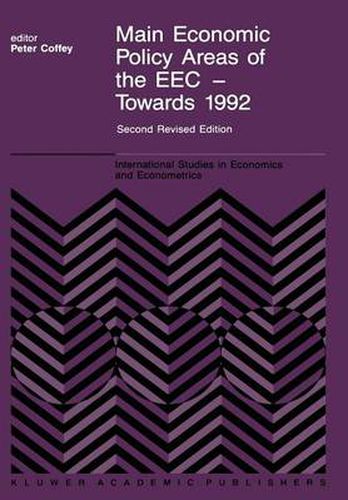Readings Newsletter
Become a Readings Member to make your shopping experience even easier.
Sign in or sign up for free!
You’re not far away from qualifying for FREE standard shipping within Australia
You’ve qualified for FREE standard shipping within Australia
The cart is loading…






This title is printed to order. This book may have been self-published. If so, we cannot guarantee the quality of the content. In the main most books will have gone through the editing process however some may not. We therefore suggest that you be aware of this before ordering this book. If in doubt check either the author or publisher’s details as we are unable to accept any returns unless they are faulty. Please contact us if you have any questions.
At the end of 1992, things will never again be the same inside the European Economic Community (EEC), because, as that year draws to a close, the aims of the Single Act of European Union (SAEU), which became law in July, this year, will have become effective - thus creating a ‘real’ Common Market. This will mean that there will no longer be any obstacles to the free movement of goods between the Member States. Equally, and for the first time in the EEC’s history, internal capital movements will be absolutely free, there will no longer be any exchange controls and it will be possible to freely establish financial services between EEC countries. Likewise, as currently being proposed by Lord Cockfield, wide variations in the levels of value added tax (VAT) between Member States will not be allowed. Also, in the case ~f the Common Agricultural Policy (CAP), it will no longer be possible (nor even necessary) to have the monetary compensatory amounts (MCA’s). All these changes - but especially the increased freedom in capital movements - will have profound consequences for the different regions of the Community and it will be desirable to have a much more dynamic Regional Policy before 1993. Last, but by no means least, a greater number of decisions inside the Community will be made by majority voting and the Parliament will be endowed with enhanced powers.
$9.00 standard shipping within Australia
FREE standard shipping within Australia for orders over $100.00
Express & International shipping calculated at checkout
This title is printed to order. This book may have been self-published. If so, we cannot guarantee the quality of the content. In the main most books will have gone through the editing process however some may not. We therefore suggest that you be aware of this before ordering this book. If in doubt check either the author or publisher’s details as we are unable to accept any returns unless they are faulty. Please contact us if you have any questions.
At the end of 1992, things will never again be the same inside the European Economic Community (EEC), because, as that year draws to a close, the aims of the Single Act of European Union (SAEU), which became law in July, this year, will have become effective - thus creating a ‘real’ Common Market. This will mean that there will no longer be any obstacles to the free movement of goods between the Member States. Equally, and for the first time in the EEC’s history, internal capital movements will be absolutely free, there will no longer be any exchange controls and it will be possible to freely establish financial services between EEC countries. Likewise, as currently being proposed by Lord Cockfield, wide variations in the levels of value added tax (VAT) between Member States will not be allowed. Also, in the case ~f the Common Agricultural Policy (CAP), it will no longer be possible (nor even necessary) to have the monetary compensatory amounts (MCA’s). All these changes - but especially the increased freedom in capital movements - will have profound consequences for the different regions of the Community and it will be desirable to have a much more dynamic Regional Policy before 1993. Last, but by no means least, a greater number of decisions inside the Community will be made by majority voting and the Parliament will be endowed with enhanced powers.